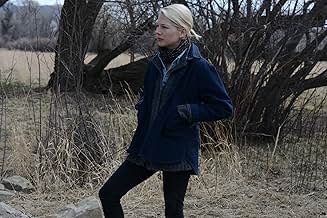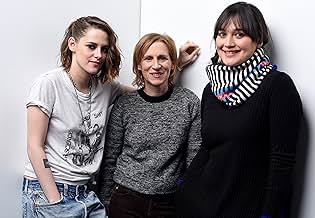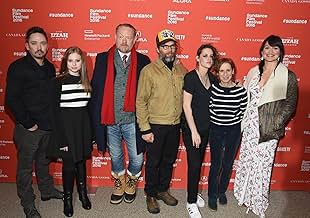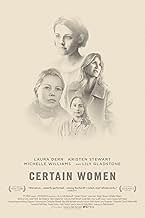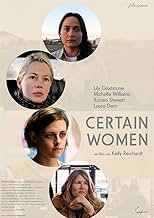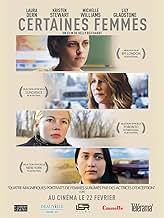IMDb रेटिंग
6.4/10
17 हज़ार
आपकी रेटिंग
तीन महिलाओं का जीवन छोटे शहर अमेरिका में प्रतिच्छेद करता है, जहां प्रत्येक अपूर्ण रूप से एक निशान को धधक रहा है।तीन महिलाओं का जीवन छोटे शहर अमेरिका में प्रतिच्छेद करता है, जहां प्रत्येक अपूर्ण रूप से एक निशान को धधक रहा है।तीन महिलाओं का जीवन छोटे शहर अमेरिका में प्रतिच्छेद करता है, जहां प्रत्येक अपूर्ण रूप से एक निशान को धधक रहा है।
- निर्देशक
- लेखक
- स्टार
- पुरस्कार
- 11 जीत और कुल 49 नामांकन
Sara Twist
- Guthrie
- (as Sara Rodier)
फ़ीचर्ड समीक्षाएं
In rural / small-town Montana, three stories interact: a lawyer (Laura Dern) seems unable to set boundaries with an ex-client (Jared Harris) who is unhinged and deranged; a rather uptight woman (Michelle Williams) tries to find motivation in building a new home even though her husband and teenage daughter are growing more and more distant from her; a young rancher (Lily Gladstone) is infatuated with a recent law graduate (Kristen Stewart) who arrives in her town twice a week to teach an educational law night class.
"Certain Women" is written and directed by Kelly Reichardt and based on short stories by Maile Meloy. Like other Reichardt films (her best is "Meek's Cutoff" (2010)), this one tells so much in the unspoken word - where a silent reply says so much more than a bluntly worded statement. She is blessed with a superb cast who can make the viewer feel so much with a camera lingering on their faces.
It's tempting to think "nothing is happening" at the beginning of each segment. But once viewers catch on to Reinhardt's unique style, they can see that a lot is actually happening. The Gladstone/Stewart story stands out for various reasons and not just the great acting (Gladstone rightly won many awards for her performance). It provides a great re-telling of the tragic story of someone having a crush on another who aspires to be (or already is) in a higher class in the socioeconomic hierarchy.
Their story, like the others, have a theme of loneliness and isolation even for those who are surrounded by people. This film has a special and unique charm that is quite rewarding. - dbamateurcritic.
"Certain Women" is written and directed by Kelly Reichardt and based on short stories by Maile Meloy. Like other Reichardt films (her best is "Meek's Cutoff" (2010)), this one tells so much in the unspoken word - where a silent reply says so much more than a bluntly worded statement. She is blessed with a superb cast who can make the viewer feel so much with a camera lingering on their faces.
It's tempting to think "nothing is happening" at the beginning of each segment. But once viewers catch on to Reinhardt's unique style, they can see that a lot is actually happening. The Gladstone/Stewart story stands out for various reasons and not just the great acting (Gladstone rightly won many awards for her performance). It provides a great re-telling of the tragic story of someone having a crush on another who aspires to be (or already is) in a higher class in the socioeconomic hierarchy.
Their story, like the others, have a theme of loneliness and isolation even for those who are surrounded by people. This film has a special and unique charm that is quite rewarding. - dbamateurcritic.
Director Kelly Reicart knows strong women and the strong circumstances they've faced moving West (Meek's Cutoff) and more than 100 years later the modern Northwest (Certain Women). Big Sky Country, Montana, is the modern setting: Billings, Bozeman, and environs, the places where three women are ignored by men, misunderstood by both men and women, and call many of the shots that may end up putting food on their tables and courage in their hearts.
Although feminists should be proud of the three heroines in Certain Women, their actions are not so much the stuff of heroics as they mostly navigate around misogyny and sloth in a world that mostly listens to men first even if the women are right most of the time.
Laura Wells (Laura Dern) is an attorney with not really a thriving practice, but she gets along. One client, Fuller (Jared Harris), is a worker trying in vain to get more compensation for an accident while he slowly becomes derailed. In the most fraught incident of the trilogy, she must enter a building with a bullet-proof vest to face him as he holds a guard hostage. That she is the one to confront him, and not a crisis squad, is one of the stories' touches that clarifies why the heroines are "certain" women.
Gina Lewis (Michelle Williams) is building a prairie house, part of which will be built with a pile of stones, she, not her husband, tries to convince an old man to sell. Her quiet resolve in the face of mostly feckless men is not so much heroic as it is her certainty that she must be the strong one.
Jamie (Lily Gladstone), a portly ranch hand who falls for an evening school teacher-lawyer, Beth Travis (Kristen Stewart), is the least glamorous of the three (no I Phone for this cowgirl) but with an inner depth that eclipses the other two. Jamie and Beth's evening ride to the diner on a horse is romantic in a subtle way rarely seen before.
If you think I haven't described anything dramatically worthy of a full-length motion picture, you're right. The real drama bleeds out of the actors' interior depictions, the personal strength that overcomes diminishment by the vast plains, snow-capped mountains, and weak men.
Because the three episodes are derived from native Maile Maloy's short stories, Certain Women is a tour de force of feminism disguised as rambling stories of women making a hard living in a hard West. Hooray for them as the cowboys and the horses are not the real forces at work.
Although feminists should be proud of the three heroines in Certain Women, their actions are not so much the stuff of heroics as they mostly navigate around misogyny and sloth in a world that mostly listens to men first even if the women are right most of the time.
Laura Wells (Laura Dern) is an attorney with not really a thriving practice, but she gets along. One client, Fuller (Jared Harris), is a worker trying in vain to get more compensation for an accident while he slowly becomes derailed. In the most fraught incident of the trilogy, she must enter a building with a bullet-proof vest to face him as he holds a guard hostage. That she is the one to confront him, and not a crisis squad, is one of the stories' touches that clarifies why the heroines are "certain" women.
Gina Lewis (Michelle Williams) is building a prairie house, part of which will be built with a pile of stones, she, not her husband, tries to convince an old man to sell. Her quiet resolve in the face of mostly feckless men is not so much heroic as it is her certainty that she must be the strong one.
Jamie (Lily Gladstone), a portly ranch hand who falls for an evening school teacher-lawyer, Beth Travis (Kristen Stewart), is the least glamorous of the three (no I Phone for this cowgirl) but with an inner depth that eclipses the other two. Jamie and Beth's evening ride to the diner on a horse is romantic in a subtle way rarely seen before.
If you think I haven't described anything dramatically worthy of a full-length motion picture, you're right. The real drama bleeds out of the actors' interior depictions, the personal strength that overcomes diminishment by the vast plains, snow-capped mountains, and weak men.
Because the three episodes are derived from native Maile Maloy's short stories, Certain Women is a tour de force of feminism disguised as rambling stories of women making a hard living in a hard West. Hooray for them as the cowboys and the horses are not the real forces at work.
8vsks
You know from the movie previews and the rumblings from the multiplex's adjacent theater that today's movies are heavily weighted toward "action films." Writer-director-editor Kelly Reichardt could singlehandedly reverse that trend with Certain Women, which can most succinctly be described as an "inaction film." It's kind of hard to get used to Reichardt's pace, so you might watch this and think "Wha---?" Here, the drama is at the deep inside the characters, hidden from all views except the closest. And that's what it gets from Reichardt—"a poet of silences and open spaces," says A.O. Scott in the New York Times. Based on short stories by Maile Meloy, the film is set in and around Livingston, Montana, and the views of the lonely snowswept plains are breathtaking. The story is presented in three separate vignettes that barely intersect. In the first, Laura Dern plays Laura Wells, a lawyer trying to convince her persistent client (Jared Harris) that he can't sue his former employer for on-the-job injuries because he already accepted a settlement. The client doesn't believe it until a male lawyer tells him the same thing. She's disappointed at many levels—with her clients, her career, her love life. The middle vignette involves Gina (Michelle Williams), a married woman with a disaffected teenage daughter. She and her husband are building a new house, and she hopes to convince a slightly addled, elderly neighbor (Rene Auberjonois) to sell them a pile of unused sandstone blocks in his front yard. Behind Gina's bright smile, you can feel her irritation that the neighbor focuses his attention not on her request but on her husband, eliding the decision, and finally the husband sells her out. Even within the bosom of her family, it's clear, she's alone. The dreamiest and most poignant sequence follows the young woman Jamie—beautifully underplayed by Lily Gladstone—on her daily routine, feeding and caring for a group of horses on a remote ranch. The repetitiveness of her tasks in the snowy, mountains in the distance, is mesmerizing. Her routine and her equilibrium are disturbed by a chance acquaintance with Beth, a harried young lawyer played by Kristen Stewart, overwhelmed by her own, very different grind. The extent of Jamie's disturbance is painfully revealed in her quiet face, upon which "silent passion surges like an underground stream," Scott says. The acting is subtle and true, and Reichardt closely follows the dictum, "show, don't tell." Her characters don't scream and rail and tell you what their issues are. You see it laid bare in front of you.
Kelly Reichardt is one of those director/writers who has made it their focus to film, the unfilmable, ordinary people in their downtime simply reacting or not reacting to things. This is all well and good, and each piece of Certain Women works beautifully on their own, but as a collection pulled together it feels random and unfocused and not in a good way.
The three stories of Certain Women are all set in and around the same small town in Montana and are also loosely connected (a few side characters show up in different segments which are more of a distraction than a convincing narrative thread). The women of the three stories are Laura (Laura Dern) a personal injury lawyer dealing with a disabled and embittered client who won't accept that he signed away his rights, Gina (Reichardt's muse Michelle Williams, working with her fort the third time) an uptight woman trying to get the material needed for her dream home, and Jamie (newcomer Lily Gladstone, amazing), a lonely rancher who unexpectedly falls for a lawyer she meets in the strangest of circumstances. The stories are all very undramatic and subtle but in Reichardt's hands the material absolutely sings. There is a lot of depth and nuance to these characters and it is wonderful to watch them. Unfortunately she does not afford equal time to all the characters and this has the effect of making her film feel lopsided.
The best segment in the film is the one with Gladstone's rancher, and I sincerely wish that Reichardt had worked out a way to pad it out with 40 more minutes of material because at 50 minutes it is the longest segment by far and it is the most interesting and the most poignant.
The three stories of Certain Women are all set in and around the same small town in Montana and are also loosely connected (a few side characters show up in different segments which are more of a distraction than a convincing narrative thread). The women of the three stories are Laura (Laura Dern) a personal injury lawyer dealing with a disabled and embittered client who won't accept that he signed away his rights, Gina (Reichardt's muse Michelle Williams, working with her fort the third time) an uptight woman trying to get the material needed for her dream home, and Jamie (newcomer Lily Gladstone, amazing), a lonely rancher who unexpectedly falls for a lawyer she meets in the strangest of circumstances. The stories are all very undramatic and subtle but in Reichardt's hands the material absolutely sings. There is a lot of depth and nuance to these characters and it is wonderful to watch them. Unfortunately she does not afford equal time to all the characters and this has the effect of making her film feel lopsided.
The best segment in the film is the one with Gladstone's rancher, and I sincerely wish that Reichardt had worked out a way to pad it out with 40 more minutes of material because at 50 minutes it is the longest segment by far and it is the most interesting and the most poignant.
I appreciate a pretty wide variety of films. I wouldn't call myself an indie junkie, but I like creativity that gets me to think or be aware in a new way and indie can certainly do that. Of course, sometimes aspects of a film will evade me (what was X about? what did Y mean?) and then I seek out others--and IMDb--to fill in the gaps.
I have to admit, I left this film lost and unsatisfied. Too MUCH of it was a gap for me. Sure, I had some basic insights: how the normal-ness of life is worthy of attention and how the painful constancy of loneliness exists in so many lives. The acting was good. I found the long pans and the "un-action" movie action interesting. At least for a while. But by about halfway, that was it. Those insights just repeated themselves. I spent the second half hoping for something to shed light, to at least tie some loose ends together. But it never came.
And it wasn't just me and my friend. As we sat in the emptying theater after the movie, discussing our thoughts about it, an elderly lady shuffled out behind us and said, "I don't mean to blow my own horn, but I have a Ph.D. in English Literature. And STILL I can't figure out what that movie was about! Do you?" So it wasn't just me.
This is all I can conclude: This film slowly detailed 3 vignettes, suggesting there was something being told. Then it had nothing to say. Maybe it's a Zen thing. But it wasn't a satisfying experience for me. The stories came out of nowhere and went nowhere, albeit with some beautiful scenes and emotions presented along the way and excellent acting. When it was over, there was no "there" there for me. I think that's what left me feeling unsatisfied. It was like a pretty mosaic left in pieces. I can infer that someone formed a design with it and I want to see that design. But it's in pieces and, try as I might, I can't put the pieces together. In fact, it feels like some pieces are missing. So I walk away baffled.
Maybe this says more about me than this movie. Whatever the case, I walked away unsettled and not in an enlightened way. That didn't feel good.
I have to admit, I left this film lost and unsatisfied. Too MUCH of it was a gap for me. Sure, I had some basic insights: how the normal-ness of life is worthy of attention and how the painful constancy of loneliness exists in so many lives. The acting was good. I found the long pans and the "un-action" movie action interesting. At least for a while. But by about halfway, that was it. Those insights just repeated themselves. I spent the second half hoping for something to shed light, to at least tie some loose ends together. But it never came.
And it wasn't just me and my friend. As we sat in the emptying theater after the movie, discussing our thoughts about it, an elderly lady shuffled out behind us and said, "I don't mean to blow my own horn, but I have a Ph.D. in English Literature. And STILL I can't figure out what that movie was about! Do you?" So it wasn't just me.
This is all I can conclude: This film slowly detailed 3 vignettes, suggesting there was something being told. Then it had nothing to say. Maybe it's a Zen thing. But it wasn't a satisfying experience for me. The stories came out of nowhere and went nowhere, albeit with some beautiful scenes and emotions presented along the way and excellent acting. When it was over, there was no "there" there for me. I think that's what left me feeling unsatisfied. It was like a pretty mosaic left in pieces. I can infer that someone formed a design with it and I want to see that design. But it's in pieces and, try as I might, I can't put the pieces together. In fact, it feels like some pieces are missing. So I walk away baffled.
Maybe this says more about me than this movie. Whatever the case, I walked away unsettled and not in an enlightened way. That didn't feel good.
क्या आपको पता है
- ट्रिवियाReichardt revealed that one of the reasons she chose to shoot on film was because snow appears "flat" in other formats. Interestingly enough, when she began shooting, there was little to no snow at all in Montana.
- गूफ़When Elizabeth Travis first starts her school law course, she begins writing her name as "Eliz..." on the blackboard, then wipes it out and simply writes "Beth". A little later a fully written but crossed out "Elizabeth" appears next to the "Beth".
- कनेक्शनFeatured in Women Make Film: A New Road Movie Through Cinema (2018)
- साउंडट्रैकPlay with My Heart
Performed by Taye Johnson
Courtesy of Yebo Music by arrangement with Bank Robber Music
टॉप पसंद
रेटिंग देने के लिए साइन-इन करें और वैयक्तिकृत सुझावों के लिए वॉचलिस्ट करें
- How long is Certain Women?Alexa द्वारा संचालित
विवरण
- रिलीज़ की तारीख़
- कंट्री ऑफ़ ओरिजिन
- भाषा
- इस रूप में भी जाना जाता है
- Ciertas mujeres
- फ़िल्माने की जगहें
- Livingston, मोंटाना, यूएसए(law offices at 116 Callender St. and 110 B South St.)
- उत्पादन कंपनियां
- IMDbPro पर और कंपनी क्रेडिट देखें
बॉक्स ऑफ़िस
- US और कनाडा में सकल
- $10,87,585
- US और कनाडा में पहले सप्ताह में कुल कमाई
- $60,898
- 16 अक्टू॰ 2016
- दुनिया भर में सकल
- $15,31,261
- चलने की अवधि1 घंटा 47 मिनट
- रंग
- ध्वनि मिश्रण
- पक्ष अनुपात
- 1.85 : 1
इस पेज में योगदान दें
किसी बदलाव का सुझाव दें या अनुपलब्ध कॉन्टेंट जोड़ें





